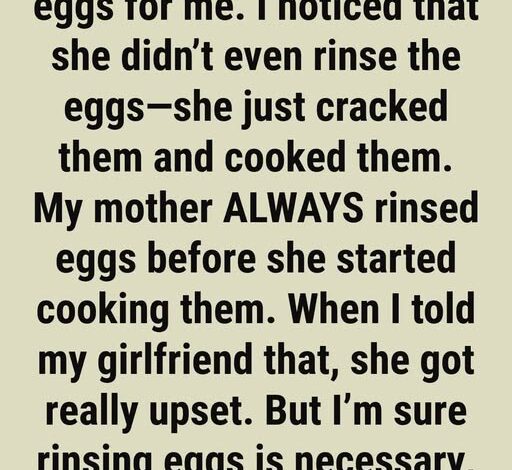Most people crack open an egg without thinking twice, but the question of whether you should wash an egg before you use it isn’t as simple as it looks. That smooth little shell carries a story — one that starts the second the egg is laid and ends in your kitchen. Some people feel compelled to scrub every egg spotless, convinced they’re protecting themselves. Others insist washing is a bad idea. The truth sits somewhere in the tension between those instincts, and if you understand how an egg protects itself, the answer becomes obvious.
When a hen lays an egg, it isn’t just a shell and a yolk. It comes coated in a natural protective layer called the cuticle, or “bloom.” You can’t see it, and you probably wouldn’t know it’s there unless someone pointed it out, but that thin film does more for you than any sink rinse ever could. The cuticle seals tiny pores across the surface of the shell — the same pores that allow air to flow to a developing chick. Without that seal, bacteria like Salmonella have a direct invitation inside. Nature designed the bloom to keep anything harmful out, preserving the egg in a way humans couldn’t replicate for thousands of years.
The moment you wash an unprocessed egg under running water, you risk stripping that protective layer away. The water doesn’t just rinse the shell; it opens those microscopic doorways, and once the bloom is gone, it’s gone for good. Bacteria on the shell, on your counter, even on your hands can now pass through the weakened shell more easily. Ironically, what feels like “cleaning” can make the egg more vulnerable than it was to begin with.
This is where things get complicated, because not all eggs follow the same rules. In the United States, Japan, and a few other countries, the law requires commercial egg producers to wash and sanitize eggs before they’re packaged. They use controlled temperatures, specialized detergents, and rapid drying procedures designed to clean the shell without destroying the egg’s integrity. After that washing process, the eggs must be refrigerated from storage to transport to the supermarket shelf. That cold chain is crucial; it stops bacteria from multiplying after the bloom has been removed.
In Europe, Australia, and many other parts of the world, the opposite approach is taken. Commercial eggs are sold unwashed so the cuticle stays intact, and this natural protection means they don’t need refrigeration before sale. Once the consumer takes them home, chilling is optional but recommended, and the bloom remains untouched until the egg is used.
So the question — “Should you wash your eggs?” — depends entirely on what kind of eggs you have in front of you.
If the eggs came from a store in a country where washing is required, they’ve already been cleaned in a controlled environment. Washing them again at home does nothing for safety and may even worsen the risk by driving water and bacteria into the shell more quickly. These eggs should go straight into the refrigerator and stay there until you’re ready to cook them. If one looks a little dirty, wiping it with a dry or barely damp cloth is enough.
If the eggs came fresh from a farm, a backyard coop, or a local market where they were sold unwashed, the rules shift. The bloom is still there, still sealing the shell, and still doing its job. For these eggs, washing should be avoided until right before you use them — if you wash at all. A little dirt on the outside doesn’t make the inside unsafe. If an egg is heavily soiled, spot-cleaning with a dry brush or lightly damp cloth is the safer method. Only in extreme cases should you consider washing, and even then, the egg should be used immediately afterward because the protective layer has been compromised.
A particularly dirty egg isn’t a treasure. If the contamination is heavy enough that cleaning becomes more trouble than it’s worth, discarding it might be the smarter move. A fresh egg is not worth the gamble.
No matter where the eggs come from, your own handling matters. Wash your hands before and after touching eggs, keep your counters clean, and never leave cracked eggs sitting out. Cooking eggs thoroughly eliminates the bulk of bacterial risk, which is why runny yolks can be a concern if the eggs aren’t from a trusted source.
Storage is another crucial detail people often misunderstand. Refrigeration slows down any potential bacterial growth and keeps the egg fresher for longer. Once refrigerated, an egg should stay refrigerated — taking it in and out of the fridge causes condensation that can pull bacteria through the shell.
If you buy washed eggs, keep them cold from the moment you bring them home. If you buy unwashed eggs, you can leave them at room temperature for a while, but the moment you refrigerate them, commit to it.
People have strong opinions about washing eggs because the shell looks like something that needs sanitizing. But the shell isn’t the shield — the bloom is. Nature took care of the first line of defense long before humans ever figured out food safety guidelines. When you ignore that natural system, even with good intentions, you can make things worse.
The core idea is simple: not everything that looks like dirt is a threat, and not everything that looks like cleaning is protection. Sometimes the smartest, safest move is to leave the egg exactly as it is until the moment you need it.
Understand the bloom, know where your eggs came from, and handle them with awareness. Your breakfast — and your peace of mind — will be better for it.
